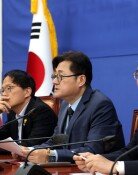Two Koreas agree to connect cross-border railways and roads
Two Koreas agree to connect cross-border railways and roads
Posted October. 16, 2018 07:59,
Updated October. 16, 2018 07:59
The two Koreas had high-level talks at Panmunjom Monday and agreed to hold a groundbreaking ceremony between the end of November and early December to connect and modernize cross-border railways and roads. The two Koreas will resume a joint site survey at the end of October, starting from the Gyeongui Railroad. Connecting cross-border railways and roads is a must in that they are key infrastructure, accelerating reform and opening of North Korea and increasing inter-Korean exchanges. The previous conservative government also hoped to deliver the project. It would be great opportunities for Korean businesses once the North denuclearizes and the two Koreas begin economic cooperation in earnest. The problem is the timing, speed, and the scale of the project.
It is not clear whether the groundbreaking ceremony agreed by the two Koreas Monday is limited to just connecting the disconnected cross-border railways and roads or includes modernizing the entire railways and roads in North Korea. If the agreement includes the latter, it runs counter to the foundation of the sanctions imposed by the United Nations Security Council on North Korea. The South Korean government should limit the scope of the construction project to connecting cross-border railways and roads until the North makes progress toward denuclearization and persuade the United Nations or Washington that modernizing the entire railways and roads in the North is a long-term plan that would be launched after the complete denuclearization of North Korea.
South Korean President Moon Jae-in promised to connect the cross-border railways and roads within the year at the September inter-Korean summit in Pyongyang. But discussion on sanctions relief on North Korea is not making any progress. Therefore, the South Korean government should have promoted the construction project only if North Korea was granted an exemption from U.N. sanctions even if the project is limited to connecting cross-border railways and roads. Without the exemption, equipment and supplies for the project will not be allowed into North Korea.
The South Korean government expects that there would be not a major disagreement with the United States on the matter since Seoul and Washington had constant discussion. But the government’s plan to survey the northern section of the Gyeongui Railroad in August fell through as the United Nations Command, which is currently securing the demilitarized zone (DMZ), did not approve it. The international community, including the United States, is very sensitive to any signs that South Korea might move away from the sanctions against North Korea. Moreover, U.S. President Donald Trump is seeking to strengthen the sanctions against North Korea as the second summit between Washington and is likely to be postponed to next year.
The South Korean government emphasizes that progress in inter-Korean relations will prevent North Korea from going back to the past. On the contrary, South Korea, China, and Russia are weakening international efforts to sanction North Korea. These moves could give North Korea the wrong idea that time is on their side. The South Korean government should also inform the public of the detailed plan and resources required for the construction project.







